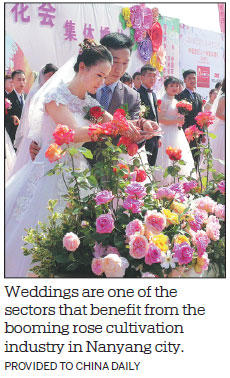Nanyang Residents Reaping Benefits of Flower Cultivation
A growing number of local residents have benefited from the booming rose cultivation industry in Nanyang, a large and populous city in the southwest of Henan province, according to the local government.
The city has a total of 466 rose planting companies that have employed more than 100,000 people, the government figures indicate.
The aggregate planting area of roses amounted to more than 6,600 hectares, which can grow more than 1 billion seedlings and generate an output value of at least 2 billion yuan ($298.3 million) annually, making Nanyang the largest rose production base in China.
The city plans to further raise its rose planting area to 10,000 hectares by the end of 2020, which is expected to generate an annual output value of 10 billion yuan, of which 3 billion yuan comes from the sales of the roses and seedlings and 2 billion yuan from the intensive processing of the roses. The last 5 billion comes from the tertiary industry, which relies on eco-tourism, floriculture and healthcare, according to the government plan.

"The quality of the rose seedlings in Nanyang has been greatly improved with technical innovation and by bringing in famous varieties. The prices of a single seedling of many species in the market rose from 0.5 yuan to 1.5 or 2 yuan on average," said Wang Guiyu, a rose expert and general manager of a rose research base in Nanyang.
The city government encourages local companies to cooperate with universities and research institutions to develop new varieties, techniques and materials for the rose processing industry.
Currently, five companies specialize in making rose-related products like flower tea, essential oil, snack food, cosmetics, rose sauce and rose wine. Similar companies are expected to be incubated in a start-up industrial park in Nanyang.
In Shiqiao town of Wolong district, the local government set up a lab that has produced a series of achievements on seedling preservation, off-season transplantation and cold storage technology designed specifically for roses.
The industry has also created more jobs for locals, with annual salaries that could reach 100,000 yuan, according to the industrial insiders.
For instance, an experienced worker, usually female, who can graft 800 to 1,000 trees every day, will earn 100 to 300 yuan daily.
In Shiqiao town, more than 4,000 rural families are working for 110 rose companies. The companies also employ physically disabled people, and provide free seedlings and technical support to poverty-stricken families. The goal is for every family to be financially sustainable.
(China Daily 04/24/2019 page12)
